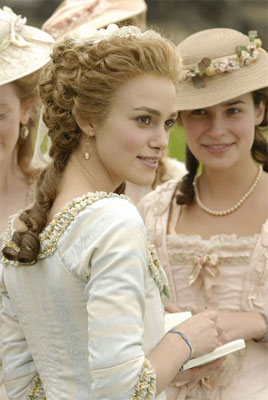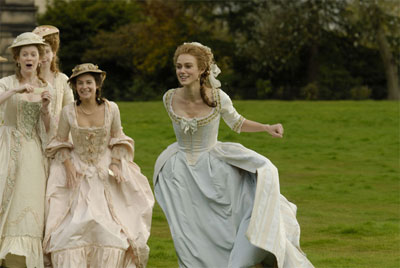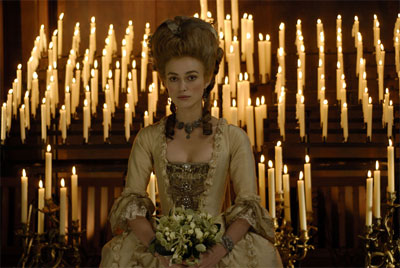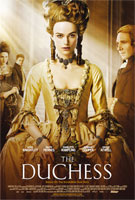Keira Knightley The Duchess Interview

KEIRA KNIGHTLEY- SIMPLY ROYALTY
Keira Knightley, The Duchess Interview by Paul Fischer in Toronto.There seems there is a lot in common between British actress Keira Knightley and her latest cinematic incarnation, Georgiana, The Duchess of Devonshire. Both are fashion icons, celebrities and compelling in their own way. The truer story of the 18th century superstar of sorts who ended up living with both her husband and his mistress, gives the actress a chance to shine. This very reluctant star who clearly hates publicity, talked to the media at this year's Toronto Film Festival. Paul Fischer was there.
Paul Fischer: This is one of those great roles, where practically every scene you get to go through the whole gamut of stuff. What was your response when you first read the script? Did you know anything about The Duchess?
Keira Knightley: I'd never heard of her before, no. So the script came through my door with three very large huge white ostrich feathers attached, with a gold ribbon. And I thought, "Oh, I don't care what it is. That's fantastic." Then I read it and I know I just thought that she was fabulous and a fascinating character, this idea of this woman who's politically so influential, this huge fashion icon, such a force of nature, and yet privately is somebody who is so intensely vulnerable and incredibly lonely. I thought, the combination of those two things were sort of fascinating.
Paul Fischer: Were you worried at all that you'd be able to pull it off?
Keira Knightley: Oh, yeah. I mean, I think there's always that worry. I think - you know, you have to face failure. And particularly if you're an actress or an actor - you know, sometimes things aren't gonna go the way that you hoped they will. But that's part of what's so exciting about the job, you know? And I don't really want to do things that I don't find challenging. So yes, there's always a huge fear that it's going to be awful, and I'm going to be crap, and all the rest of it. But you might as well go for it anyway.
Paul Fischer: Could you identify with the notion that even in the 1700s, it appeared that the public was obsessed with so-called celebrities. Do you identify with the kind of parallels that this film is making with today? Especially you, being in the public eye?
Keira Knightley: I certainly don't look for autobiographical work, so I wasn't looking to draw any parallels with myself whatsoever. I thought, yes, it was interesting. I thought that celebrity culture was a modern phenomenon. It's fascinating to find out that it was around 300 years ago. I sort of thought it was kind of the least interesting aspect of the story, in a funny kind of way, though. I mean, I thought that the way that she used it, the manipulation of image and everything, I thought that was very interesting. What it was saying about the kind of mental state-that as the marriage started collapsing, she needed more and more and more attention from complete strangers, was an interesting sort of - this sounds like a psychological aspect to the character. But no, I wasn't trying to draw any parallels to myself.
Paul Fischer: I'd like to know, what was your reaction to playing a woman that has to encounter the kinds of things she goes through like living with the other woman, in the same house.
Keira Knightley: Yeah, I thought it was very interesting dynamics between the characters, definitely. You know, the idea of living with a husband that you absolutely don't understand. Almost like two magnets repelling each other. That there is no point of comfort between two people. It was really interesting with Ralph to kind of explore that. The betrayal of your best friend, and then having to sort of live with this woman, and go from a very intense friendship into hatred, and back to a kind of mutual kind of respect for one another. I thought that that was an interesting journey, as far as a friendship between two women go. I mean, yes, it's a horrendous situation that she finds herself in. But what I sort of found quite inspiring was the fact that she survives. She doesn't survive without scars, but she does actually get through it. I thought that was an extraordinary thing.
Paul Fischer: So she's not a victim.
Keira Knightley: I didn't like to think of her as a victim. I don't think victims are particularly attractive, in that kind of-as a character trait, you know? But what happens to her is horrendous. So, I think what both Ralph and I were very conscious of is not making it into a victim-villain storyline. And yes, she's horrendously oppressed, and all the rest of it. But I think actually, fundamentally, she's a survivor.
 Paul Fischer: Right at the beginning of the film, there's the first energy as the Duchess, and there's the speech that Fox gives, and they have that conversation where she describes freedom as an absolute. That there can't be scales of it and the film - or the theme seems to belie that. In fact, all the characters in the film spend most of the time encountering the scales of freedom that they're allowed to have. I'm just wondering how it was to have to play that
Paul Fischer: Right at the beginning of the film, there's the first energy as the Duchess, and there's the speech that Fox gives, and they have that conversation where she describes freedom as an absolute. That there can't be scales of it and the film - or the theme seems to belie that. In fact, all the characters in the film spend most of the time encountering the scales of freedom that they're allowed to have. I'm just wondering how it was to have to play that Keira Knightley: I'd never actually thought of that. You're completely right. It's all about freedom in moderation. You're completely right. And I think it's a wonderful kind of engine to propel a character through a storyline, when you have somebody who's constantly trying to break out of boxes, and constantly being pushed back into them. I think that that was very much sort of the motion, if you like, of this character and a lot of the characters around the way through.
Paul Fischer: The last few times you and I spoke has been for a period drama. You always get asked about your affinity for period dramas. Are you at the point at where you want to try to do something more modern?
Keira Knightley: What, just because people keep asking me about period films?
Paul Fischer: Well, just for your own personal GRATIFICATION
Keira Knightley: No. No, I think it would - you'd be cutting your nose off to spite your face if you turned down a fantastic script and a fantastic character simply because it was set 200 years ago. I mean, apart from, I think period films now means anything from ten years ago to the beginning of time. So - you know. I mean, no. I do love period films, personally. I love the fact that you can escape into a completely different reality. I think for me, what I love about film is that it's complete escapism. And I find personally that seeing these costumes, these weird societies, helps me to forget my life, and actually just dive into the story. So I think that's why as an actress, I like being in them, as well. It's a way into a fantastic fantasy world.
Paul Fischer: I just wanted to ask a bit about Georgina. Obviously she was like a progressive woman, and the world owes a bit to her today. I want to know, like, how you think things have changed for women today because of her, and how you think things are the same today, the way that they were back then.
Keira Knightley: I don't know if it's changed because of her.
Paul Fischer: Well, like - do you think she kind of influenced, like, the women's right to vote kind of thing?
Keira Knightley: No. I mean, it came up - what, 200 years later? So, no. I mean, no. But I think she was an impressive woman. And I think that it was fascinating that in a point where women were very much - you know, sort of the property of their fathers and then their husbands, that she actually managed to - and obviously didn't have the right to vote - that she did get so passionately involved in politics. You know, it's a kind of fascinating thing, of somebody who actually has no power, and no kind of - no - very few freedoms, if you're going back to that, that she was actually so, so passionate about it.
Paul Fischer: And are things today the same as they were back then?
Keira Knightley: Well, I mean, I think if you're going back to the celebrity thing, then it's quite interesting that - you know, what we still do today, is we put women up on a pedestal, and we pick apart exactly what they wear and what they look like. The fact that we haven't moved on from that is quite interesting, I suppose.
Paul Fischer: Speaking of what you wear, you mentioned the costumes as being an element to that.
Keira Knightley: Yeah.
 Paul Fischer: How did they effect how the characters interact? Because I don't know what those hip extensions are called, that are under -
Paul Fischer: How did they effect how the characters interact? Because I don't know what those hip extensions are called, that are under - Keira Knightley: Panniers.
Paul Fischer: Panniers? But you can't whisper in somebody's ear.
Keira Knightley: [LAUGHTER] No.
Paul Fischer: You can't even get close enough. So that - it creates a whole different dynamic, in terms of just how you move through a room.
Keira Knightley: Oh, yeah, definitely.
Paul Fischer: How does that create the interaction, or affect the interaction of the characters?
Keira Knightley: I don't know. They do completely change the way you hold yourself. The way you walk, the way you breathe, therefore the way you talk. You know, they change everything about you. So it's sort of a fabulous way to get into character if you've got such an extreme costume. You know, it's amazing. I mean, as far as interaction goes. I'm not quite sure - it's quite obvious why we were called the weaker sex. Because it's - you know, you can't breathe. So, a lack of oxygen to the brain was obviously quite a difficult thing.
Paul Fischer: The press materials go to length to link this to Princess Diana, and it's subtle through the pages of the book. Did it inform your understanding of the character at all? What kind of parallels do you draw between this strong woman, who was -
Keira Knightley: I really didn't - I didn't. I mean, I think I was about 11 when she died. And, you know, I'm very aware of the images, but not really aware of exactly what her story is. And certainly not enough to be able to draw direct parallels. I mean, I didn't look into her as any sort of - I suppose "inspiration" for the character, partly because we were basing it on such a wonderful biography. So all the information that we had was - was right there. So - I mean, we very definitely did intend to make a film about Georgina, Duchess of Devonshire, not Diana.
Paul Fischer: It's a compelling story in its own right. But given the people who are promoting the film are beating that message over our head, but no one involved in the film seems to be talking about it.
Keira Knightley: Well, then there, you see the difference between marketing people and the people that made the film. [LAUGHTER]
Paul Fischer: Keira, what are the kinds of challenge you face in finding really good characters for you to sink your teeth into, and what is coming out next?
Keira Knightley: Coming up next, I don't know. I've got Edge of Love coming out in America soon. As far as challenges - could be anything. You know. I mean, I think actually doing a contemporary piece will be a challenge. I think what I love is escaping into characters. Like I said, I'm not looking for a form of self-expression, and I'm not looking for autobiographical material. I feel much more comfortable and able to kind of relax into a character if they're as far away from me as possible. So I suppose the closer a character comes to me, the more challenging I'm actually - in a funny kind of way, I think I'd find it. So maybe doing something contemporary, and in the same - I don't know, something that's quite close to me might be actually quite difficult.

The Duchess
CAST: Keira Knightley, Ralph Fiennes, Charlotte RamplingDIRECTOR: SAUL DIBB
GENRE: Romantic period drama
THE DUCHESS is a chronicle of the life of 18th century aristocrat Georgiana Spencer, the Duchess of Devonshire, who, long before the concept existed, was the original It Girl. Liker her direct ancestor Princess Diana, she was ravishing, glamorous and adored by an entire country. But even as her popularity grew, she was haunted by the fact that the only man in England she seemingly could not seduce was her very own husband, the Duke. And when she tried to find her own way to be true to her heart and loyal to her duty, the resulting controversies and convoluted liaisons pushed her to the bring of banishment by her husband, family and all of London society.
Starring Academy Award nominee Keira Knightley and Academy Award winner Ralph Fiennes, THE DUCHESS is the sumptuous story of an extraordinary woman who rose to fame by staying true to her passions in a world of protocol, gossip and social rules - and paid the price.
MORE
- Mission: Impossible Fallout
- Glenn Close The Wife
- Allison Chhorn Stanley's Mouth Interview
- Benicio Del Toro Sicario: Day of the Soldado
- Dame Judi Dench Tea With The Dames
- Sandra Bullock Ocean's 8
- Chris Pratt Jurassic World: Fallen Kingdom
- Claudia Sangiorgi Dalimore and Michelle Grace...
- Rachel McAdams Disobedience Interview
- Sebastián Lelio and Alessandro Nivola...
- Perri Cummings Trench Interview
Copyright © 2001 - Female.com.au, a Trillion.com Company - All rights reserved. 6-8 East Concourse, Beaumaris, Vic 3193, Australia.



